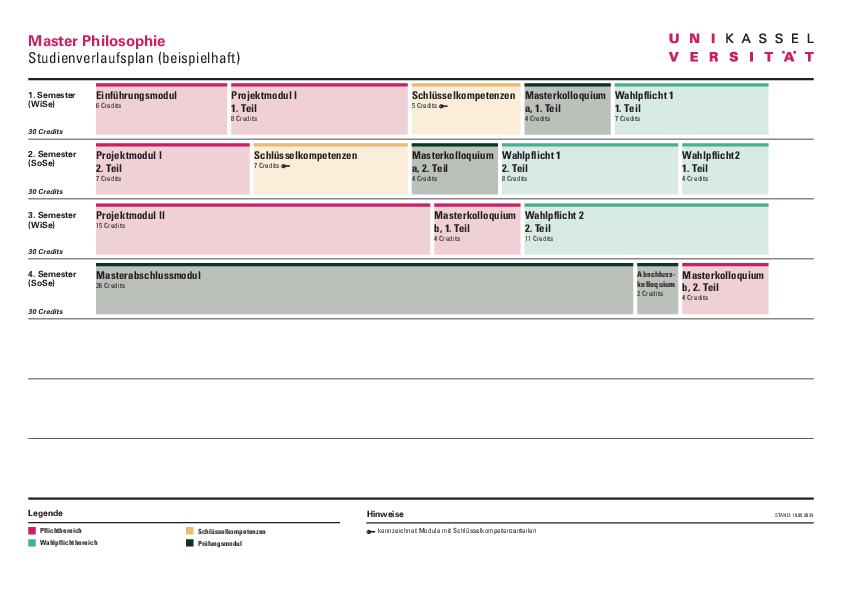Study structure
The content on this page was translated automatically.
The master's program "Philosophy: Environment - Society - Criticism" consists of the following modules:
The introductory module demonstrates the need for a critical examination of the environment and society and sets the framework for the MA program. The aim is to introduce students to the relevant topics and to demonstrate the connection between the different aspects of the program in an exemplary way.
The master's program "Philosophy: Environment - Society - Criticism" places the emphasis of philosophical thought and action on connection and interconnectedness. It thus stands in contrast to common oppositions, such as that of natural environment and social co-environment.
Global problems can only be solved globally. In this respect, all relevant questions concerning the interaction between man and nature transcend the boundaries of natural and social philosophy. The solutions sought will be interdisciplinary or even transdisciplinary. They will even transcend the boundaries of "two cultures".
The modules MA02 / MA03 are explicitly designed as project modules to train the teamwork skills and networked thinking and acting required for this situation and introduce research-related project work. Compared to the first project phase (module MA02), the module MA03 is characterized by stronger independence with regard to topic search and design and continues the work in a new team constellation and with new topic complexes. The second project can alternatively be completed as a practical project outside the university.
The module M04 deals with selected topics from the fields of philosophy of science and technology, philosophy of nature as well as philosophical anthropology and shows their relevance for problem areas relevant to environmental ethics.
Already with the environmental crisis of the 1970s, but especially with the global threat potentials of climate change or species extinction, the need for philosophical reflection on the epistemic and practical dimensions of human-nature relations is obvious. This is especially true under the conditions of a supposed Anthropocene or an apparently complete loss of nature. An adequate determination of the relations of "nature" to "culture", "technology" or "norm" and the position of man in nature must critically question both technical-scientific understandings of nature and their mythical, religious, aesthetic etc. alternatives. alternatives critically. Here, it is necessary to explore the potentials of classical philosophies of nature as well as to keep an eye on the natural philosophical frameworks of environmental ethical programs and positions. Anthropological and techno-philosophical questions belong to the core of such analyses.
The conflict potentials of our current dealings with nature give rise not least to ethical questions about the right, appropriate or good way of dealing with nature. Therefore, the aim of the module MA05 is to convey the basic framework of relevant expertise in environmental ethics. This includes knowledge of basic concepts and basic positions of environmental ethics. Specific justification approaches and positions will be presented as well as historical developments or political constellations. In addition to basic questions, the course will always introduce concrete fields of application (climate change, biodiversity, agriculture, nutrition, water ethics, technology, environmental economics, etc.). The interlocking of environmental ethical topics with socio-political questions (global growth paradigm, externalization or questions of eco-feminism) in the sense of the master program is central.
The interrelation between questions of natural and social philosophy also implies that the philosophical reflections on culture and language in the module MA06 belong to the center of the philosophical examination of our interaction with nature. In general, human knowledge and action are linguistically constituted and grounded. Also, concepts like "nature", "landscape", "wilderness" or "ecosystem" are cultural-historical phenomena and have developed their own meanings in different cultural traditions. Last but not least, environmental ethics as ethics itself is a central, linguistically constituted element of human culture. Furthermore, the Master's program has to deal with global problems: from climate change to species extinction to resource scarcity. These affect cultural forms and cultural self-understandings, question them, endanger them or challenge them to transformations. At the same time, specific cultural traditions have an impact on the way we deal with nature and give it a different cultural character.
Human natural relations are always socially and societally mediated. They express the specific historical constellation of a certain social formation. Natural relations are therefore closely related to political, economic and social relations. These are to be critically examined in MA07 to what extent they condition or shape current problem contexts of our dealings with nature. In this context, not only the role of the economic-industrial complex and the socio-political framework are to be questioned, but also the basic assumptions underlying them must be subjected to a historical contextualization and critical examination. In addition, the extent to which societal institutions such as education, law, or the public sphere contribute to hindering, initiating, or orienting societal engagement in environmental debates must be examined. This analysis also has a global dimension, as questions about climate justice, the influence of globally operating corporations or the role of financial markets show. This area also includes weighing up the opportunities and risks of global digital networking.
The master colloquium is to be attended by all MA students throughout. There, not only results from the project teams (MA02 / MA03) are presented and discussed, but also external scientists on relevant topics are invited. The colloquium is intended to ensure the exchange among MA students as well as to enable thematic bundling and concept transfer. Furthermore, the team projects as well as the public presentations will be supervised within the framework of the master colloquium.
